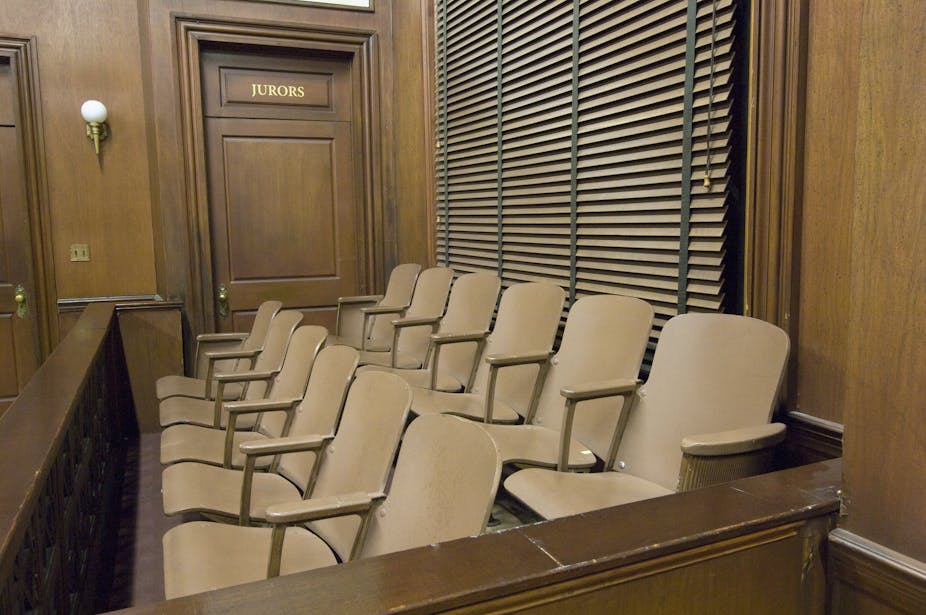actually excited for jury duty tomorrow…it’s gonna be fun to tell the defendant they’re GUILTY :P - Facebook post, 2010
Guilty guilty…I will not be swayed. Practicing [sic] for jury duty. - Twitter post, 2010
These are just two examples from the United States of jurors apparently prejudging the outcome of a criminal trial and communicating that fact on social media.
In 2010, a juror in Victoria posted on Facebook that “everyone’s guilty”. The conduct was discovered early on in the trial and the jury was discharged, with the juror referred to Victoria Police for breaching the Juries Act (2000).
But is social media use by jurors really that much of a problem? And what provisions can be put in place to ensure the continued fairness of the justice system?
Current data
There is no clear data on the use of social media by Australian jurors during trial and deliberations, although it has been described as “the elephant in the room”.
There are over 12 million active Facebook accounts in Australia, and over two million Twitter and four million LinkedIn users.
With so many social media users in Australia and the availability of mobile internet, it is easy for people to instantly access their social media accounts anytime or anywhere. Over 45,000 Australians are estimated to perform jury service each year, and as such it is highly likely that many jurors are social networkers.
What are the impacts?
There are four main ways jurors may use social media inappropriately. They can publish or distribute information about the trial; they can learn information about the case from a source outside of the court - which could increase applications to stay permanently the prosecution of criminal charges, and applications to terminate trials already underway.
In addition, jurors can contact parties, witnesses, lawyers or the judge in the trial; and discuss the merits of the case or seek opinions from other people.
At stake is the defendant’s right to a fair trial and confidence in the administration of justice. The cost implications are also significant: it is estimated that there were in excess of 4300 jury trials in Australia in 2011-12, and based on costs in NSW, the national cost of jury trials would be over A$240 million.
What can be done about it?
In cases where courts detect instances of inappropriate social media use by jurors, they may elect to dismiss the juror or jury panel, or find the juror guilty of an offence. However, a recent report commissioned by the Standing Council on Law and Justice found that:
…the apparent reluctance of courts to refer cases of juror research for prosecution is perhaps indicative of a view that jurors should not be punished where they are genuinely trying to do their best.
In this context, prevention is certainly better than the cure. The report recommended that there should exist “don’t research” directions for jurors, and that these directions should specifically refer to social media, explaining why jurors should refrain from doing their own research and the consequences of doing so.
The report also recommended research be undertaken with jurors as to the form of guidelines “most likely to be taken seriously”. Finally, they recommended that jurors receive training when they are empanelled.
In addition, our research advocates exploring options to make it easier for jurors to notify the courts about their fellow jurors’ social media activity, ensuring ongoing judicial education about the issue and possible responses to it, and requiring jurors to sign a document promising not to use social media to discuss the trial or deliberations. On the last recommendation, it is noted that:
…jurors may take the instructions more seriously and they may be more likely to remember them if they see them in writing and promise to uphold them.
We do not support removing electronic devices from jurors as already occurs in some jurisdictions. This measure may cause people to be less willing to serve on juries. A more nuanced approach is required, which recognises that jurors may use social media for some things but not others.
Overall, social networking by jurors provides a novel challenge to the administration of justice and can have a significant impact on a defendant’s right to a fair trial. As technology changes and social media sites grow in popularity, courts will continue to face the challenge of adopting new rules to address the problems created by such technology.
The courts need to find the appropriate balance between protecting the administration of justice and respecting jurors’ privacy, personal rights and freedom of information, as well as ensuring that members of the public are not dissuaded from participating in a vital part of the justice system.
This article was co-authored with Jessica Lee, BCom LLB(Hons), of Legal Aid ACT.

